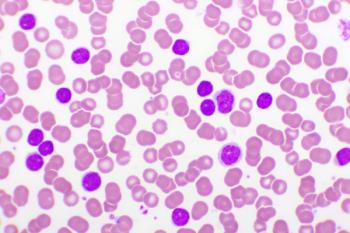
Chronic Lymphocytic Leukemia/Small Lymphocytic Lymphoma
Latest News
Latest Videos

CME Content
More News

Many cancer survivors face ongoing physical and mental health challenges, which peer support and online resources can help address, says Brian Koffman, MDCM, DCFP, FCFP, DABFP, MSEd.

Nanopore sequencing of chronic lymphocytic leukemia (CLL) may be a particularly good fit in under-resourced areas due to its lower cost and smaller laboratory footprint.

Patients with immunoglobulin M-type monoclonal gammopathy did not experience a survival benefit from targeted therapies, a study found.

Findings suggest bispecific CD3xCD20 therapy may offer an option for patients with Richter syndrome who are ineligible for transplant or CAR T-cell Therapy.

A case series suggests using minimal residual disease to trigger anti-CD20 therapy for chronic lymphocytic leukemia (CLL) can add years to some patients’ lives.

Patients with hematologic malignancies face ongoing survivorship challenges as providers struggle to coordinate care, according to Brian Koffman, MDCM, DCFP, FCFP, DABFP, MSEd.

Four autophagy-related variants in CDKN2A and BCL2 may increase susceptibility to chronic lymphocytic leukemia (CLL).

As oncology continues to move more toward precision medicine, tools like EVOFLUx may offer a more personalized roadmap from diagnosis to treatment.

Positive topline data from the phase 3 BRUIN CLL-313 showed pirtobrutinib's efficacy in the frontline setting.

Drug interactions with ibrutinib may not shorten survival when managed carefully, though the significant increase in infection-related hospitalizations tied to CYP3A inhibitors signals an urgent need for closer monitoring, dose adjustment, and proactive infection prevention strategies.

Among patients with hematologic malignancies who were diagnosed with COVID-19, about one-quarter experienced critical illness, and most of those patients died.

The findings could help clinicians individualize infection-prevention strategies in patients with relapsed or refractory chronic lymphocytic leukemia (CLL).

A single-center study comparing patients with chronic lymphocytic leukemia receiving venetoclax as part of a clinical trial and patients receiving it in routine clinical practice showed very high complete response rates in both groups.

Despite the findings, existing data around cardiovascular risk in chronic lymphocytic leukemia (CLL) are limited, and more comprehensive information is needed to draw strong conclusions.

Novel 3D analysis reveals core tumor niches drive resistance through AP-1 signaling and stromal reprogramming.

Patients with chronic lymphocytic leukemia (CLL) had significantly lower monocyte-to-lymphocyte ratio values compared with healthy controls.

Men fared better under surveillance, while women benefited more from targeted therapies for the treatment of chronic lymphocytic leukemia (CLL) in a new study.

Real-world longitudinal data suggest that in CLL, regular immunoglobulin replacement therapy may not reduce, and may even correlate with increased, serious infection rates during treatment periods.

Pirtobrutinib had a nominally superior overall response rate compared to ibrutinib in certain patients with chronic lymphocytic leukemia (CLL) or small lymphocytic lymphoma (SLL).

A cumulative review offers strong evidence that acalabrutinib has a low incidence of cardiac failure in both clinical trial and real-world settings.

Investigators found certain classes of prescriptions were also associated with outcomes, though they do not believe the association is necessarily a causal one.

New data showed a survival advantage with newer chronic lymphocytic leukemia (CLL) treatments for older patients who are typically underrepresented in clinical trials.

While physical activity was linked with improved quality of life (QOL), the majority of patients are not given the recommendation from their doctor.

TP53 mutations can have a significant impact on the prognosis of diseases like chronic lymphocytic leukemia, but their effect can vary based on numerous factors.

Switching to venetoclax led to sustained high rates of undetectable minimal residual disease, the investigators found.













